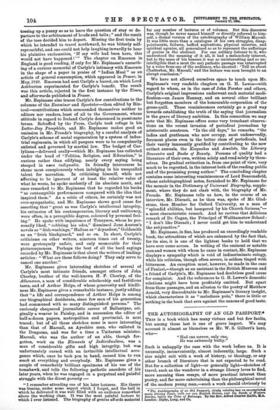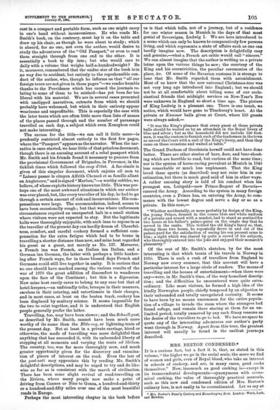THE AUTOBIOGRAPHY OF AN OLD PASSPORT.* This is a book
which has many virtues and but few faults, but among these last is one of grave import. We may account it almost as blameless as Mr. W. S. Gilbert's hero, who— "Had one sorrow, only one, Lie was extremely bulky."
Such is unhappily the case with the work before ts. It is unusually, inconveniently, almost indecently, large. Such a size might suit with a work of history, or theology, or any other branch of literature that is not expected to be read. But for a collection of light—or generally light—sketches of travel, such as the wanderer in a strange library loves to find, more amusing than essays, of more practical interest than poetry, and far more entertaining than the philosophical novel of the modern young man,—such a work should obviously be
• The Autobiography of an Old Passport, chiefly relating how we accomplishei many Driving Tours, with our own English Horses, over the Roads of Western Europe, before the Time of Railways, By the Rey, Alfred Ozarks Ontith, ILA. London; Rigby, Long, and Co,
cast in a compact and portable form, such as one might carry in one's hand without inconvenience. He who reads Mr.
Smith's book, on the contrary, must lay it on the table and draw up his chair, as though he were about to study ; which is absurd, for no one, not even the author, would desire to study the adventures of the " Old Passport," or even to read them straight through from one end to the other. It is essentially a book to dip into ; but who would care to dally with a volume that weighs half-a-hundredweight ? Be it, moreover, remembered that the undue size of the book is in no way due to accident, but entirely to the reprehensible con- duct of the author, who, though he informs us that " all our foreign tours are not given in these pages "—we render humble thanks to the Providence which has caused the journals re- lating to some of them to be mislaid—has yet been far too liberal with his material. We are in several cases presented with unclipped narratives, extracts from which we should probably have welcomed, but which in their entirety appear wearisome and unprofitable. This is especially the ease with the later tours which are often little more than lists of names of the places passed through and the number of parasangs travelled on each day, a subject which even Xenophon could not make interesting.
The excuse for the title—we can call it little more—is prudently restricted almost entirely to the first few pages, where the "Passport" appears as the narrator. When the nar- rative is once started, we hear little of that priceless document, though there is an amusing account of a rebel passport which Mr. Smith and his friends found it necessary to procure from the provisional Government of Brignoles, in Provence, in the ticklish times which followed the coup d'etat. A fac-simile is given of this singular document, which enjoins all men to " Laissez passer le citoyen Alfrith Chemed et sa famille allant en Angleterre," and is signed " Marbou,"—a worthy cobbler, we believe, of whose exploits history knows too little. This was per- haps one of the most awkward situations in which our author was ever placed, but, like every traveller of his day, he had to go through a certain amount of risk and inconvenience. His com- pensations were large. The accommodation, indeed, seems to have been occasionally rough ; but that was where unforeseen circumstances required an unexpected halt in a small station where visitors were not expected to stay. But the legitimate halts were thoroughly enjoyable, with such inns to repose in as the traveller of the present day can hardly dream of. Cheerful- ness, comfort, and careful cookery formed a sufficient com- pensation for the extra fatigue which had to be borne in travelling a shorter distance than now, and mine host regarded his guest as a guest, not merely as No. 137. Moreover, a French inn was French, an Italian inn Italian, and a German inn German, the latter with perhaps a little hanker- ing after French ways, for in those blessed days French and Germans could still live together in amity. It is curious that no one should have marked among the various results of the war of 1870 the great addition of discomfort to wanderers upon the face of the Continent ; but this is a digression. Now mine host rarely cares to belong to any race but that of hotel-keepers,--an unfriendly tribe, brusque in their manners, careless in their catering, and extortionate in their charges, and in most cases, at least on the beaten track, cookery has been displaced by sanitary science. It seems impossible for the two to exist together, and it is understood that English people generally prefer the latter.
Travelling, too, may have been slower; and the Schnell-post, as described by Mr. Smith, cannot have been much more worthy of its name than the Blitz-zug, or lightning-train of the present day. But at least in a private carriage, hired or otherwise, the mode of travelling was more delightful than anything that has succeeded it, with its unbounded liberty of stopping at all moments and varying the route ad libitum. The country, too, was far more thoroughly seen, and much greater opportunity given for the discovery and examina- tion of places of interest on the road. Even the last of the post-nati may appreciate this by reading Mr. Smith's delightful descriptions, and may be urged to try and do like- wise as far as is consistent with the march of civilisation. There has been some slight revival of road-travelling on the Riviera, where many people now make a point of driving from Cannes or Nice to Genoa, a hundred-and-thirty or a hundred-and-fifty miles over one of the most beautiful roads in Europe.
Perhaps the most interesting chapter in the book before us is that which tells, not of a journey, but of a residence for one winter season in Munich in the days of that most genial of Sovereigns, Ludwig I. We are here introduced to a scene which can only be known to comparatively few persons living, and which represents a state of affairs such as one can hardly imagine now. The description is delightfully easy and genuine,—what a French art critic would call " sincere." We can almost imagine that the author is writing us a private letter upon the various things he saw; the courtesy of the King and his eccentricities, the peculiar ceremonies of the place, &c. Of some of the Bavarian customs it is strange to bear that Mr. Smith regarded them with astonishment. Most of us know that the now universal Christmas-tree was not very long ago introduced into England ; but we should not be at all comfortable about telling some of our eccle- siastical friends that midnight services on New-Year's Eve were unknown in England so abort a time ago. The picture of King Ludwig is a pleasant one. There is one touch, we notice, which would have gone to Tbackeray's heart. At the private or Kammer balls given at Court, where 150 guests were always asked,—
" It was the King's pleasure that every guest at these private balls should be waited on by an attendant in the Royal livery of blue and silver ; but as the household did not include 160 foot- men, it was the custom to furnish such of the tradesmen in the town as served the Court with a suit of the King's livery, and then they came on these occasions and waited at table."
The Grand Duchess of Gerolstein herself could not have done better. There are other stories of hare, deer, and boar-shoot- ing which are horrible to read, but curious at the same time; nor is the system of horse-racing prevalent at Munich in 1840 less remarkable or much less unpleasant. That the King loved these sports (as described) may not raise him in our estimation, but there is much good said of him in other ways. A rather amusing story is told of his conduct when his youngest son, Luitpold—now Prince-Regent of Bavaria—
entered the Army. According to the system in many foreign countries, even a Prince has, on entering the Army, to com-
mence with the lowest degree and serve a day or so as a private. In this case,— "Whether accidentally, or more probably by design of the King, the young Prince, dressed in the coarse blue and white uniform of a private and armed with a musket, had to stand as sentinel for two hours at his father's palace-gates on the single day that he served in the ranks. This tickled the old King's fancy so, that, during those two hours, he repeatedly drove in and out of the palace-yard for the satisfaction of seeing his son present arms to him ; a sight which was shared by quite a crowd of his subjects, who thoroughly entered into the joke and enjoyed their monarch's pleasantry."
Of the rest of Mr. Smith's sketches, by far the most interesting is that which treats of his travels in Norway in 1850. There is such a rush of travellers from England to Norway now every summer, that this account will have a particular interest for a large circle of readers. The means of travelling and the houses of entertainment—when there were any—were, in Mr. Smith's time, of the very homeliest descrip-
tion ; and the difficulties he encountered were quite extra- ordinary. Like most visitors, he formed a high idea of the kindly Norwegian people, chiefly tempered by an objection to their unbounded and totally unregulated curiosity. It seems to have been by no means uncommon for the entire popula-
tion of a village to invade the room where the strangers had found refuge, and remain there staring at them for an un- limited period, totally unmoved by any such flimsy reasons as the desire of the travellers to go to bed. We have no space to quote any of the interesting adventures our author's party went through in Norway. Apart from this tour, the greatest interest will usually be found in the earliest journeys described.



















































 Previous page
Previous page